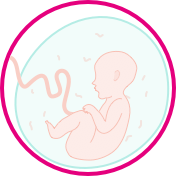Pregnancy as a perturbation principle of the intestinal microbiota: impact on intestinal inflammation and inflammation-associated cancer

Introduction
Pregnancy is an important transient physiological state associated with metabolic and immunological alterations. The gut microbiota undergoes extensive remodelling during normal pregnancy, the role of this shift for immune phenomena is only partially understood. Several features of pregnancy including low grade intestinal inflammation are transmissible to germ-free mice by faecal microbiota transfer (Vijay-Kumar, Aitken et al. 2010, Koren, Goodrich et al. 2012). Pregnancy has a complex impact on the disease course of IBD patients, with an increased risk for inflammatory flares during and early after pregnancy (Pedersen et al., 2013). We hypothesize that the pregnancy-induced intestinal microbiota changes modulate susceptibility to intestinal inflammatory responses.

Aims
We here aim to address the fundamental question how changes of composition and metabolic properties of luminal and mucosa associated microbiota are controlled during pregnancy and how these shifts are functionally related to susceptibility to intestinal inflammation and colitis-associated cancer.
- To determine whether and how pregnancy-related microbiota shifts influence susceptibility to intestinal inflammation (DSS colitis, spontaneous intestinal inflammation model) and burden of inflammation-associated (AOM-DSS) colorectal cancer,
- to test the influence of intestinal epithelial cell (IEC)-specific knockouts of IBD susceptibility genes (NOD2, ATG16L1, XBP1) on pregnancy-related host and microbial dysbiosis and re-biosis processes, and
- to identify bacterial taxa and functions, which are specifically altered in pregnant IBD patients, which may affect mucosal immune responses. Selected hypotheses from this cohort will be tested by gnotobiotic transfer experiments.

Outlook
The project will generate functional hypotheses on potential microbial alterations during pregnancy. As an outlook, we will aim to address the exact bacterial and human metabolites (or other signals) that mediate the immunomodulatory principles of pregnancy via the microbiome. Which exact metabolic principles of the microbiome convey the protective or detrimental effects during pregnancy? Can some of these principles be employed in therapeutic approaches?
Researchers
Other important members of P3
- Dr. med. Florian Tran
- Sabine Kock, technician
- Dr. Neha Mishra
- Maren Reffelmann, technician



